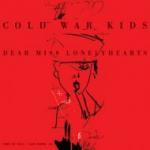
Cold War Kids Dear Miss Lonelyhearts
(Downtown)
There's a lot to be said for mediocre music. There's plenty out there that we love, that we turn to for junk food comfort, that we like purely because it satisfies a basic craving. We need an abundance of mediocrity to make a nice cushion between the good and the bad. We like mediocrity because it's pleasant and inoffensive. But we are too quick to fall into the Lake Wobegone trap, where everything is somehow above average. Critics of the Cold War Kids' fourth LP, Dear Miss Lonelyhearts, have fallen into that trap; I strongly suspect that this record is being lauded solely because it is such an improvement over their 2011 release, Mine Is Yours.
Touted as something of a concept album, Dear Miss Lonelyhearts takes us on a familiar trip to heartbreak, but without any semblance of satisfying resolution. Apart from this overarching theme, the songs are a strange hodge-podge of stylistic attempts with varying degrees of success. Fear & Trembling is utterly forgettable, almost to the point of repetitive annoyance. Loner Phase confusingly incorporates an electronic backing that makes no sense from a conceptual standpoint. Nathan Willett's (admittedly expressive) voice is grating on Tuxedos, a slower crooner of a track that pairs poorly with any vocals that aren't precisely on key. Discord can be charming, but here it sets teeth grinding. Unsurprisingly, the better tracks are the poppier ones. Water & Power, a would-be ballad were the vocals matched to the musical style, has a perfectly serviceable piano riff and nearly-there reverberating harmonies, but ultimately suffers from Coldplay levels of dull. The opener, Miracle Mile, is deceptively catchy and exciting, until you realize that it's nothing but a weak rip-off of Florence + the Machine's Dog Days are Over. (Seriously, listen to one after the other. It's uncanny.) Although the lyrics rarely stray into overwrought stereotype territory (with the exception of the title track, a minimalistic lyrical travesty wherein the hero declares he's 'given up explaining sorrow'', and the closing track, Bitter Poem, which is eponymously bad), they are wholly unremarkable.
Kathleen Hanna probably had it right. Mediocrity rules, man. Critics grade on a curve, and "better than last time" is good enough for most. I'm just a bit less forgiving, which may very well be a mistake. Certainly this record is relevant, and maybe even worth listening to with some regularity. But I can't help but feel that this album is just a watered down Arcade Fire rather than the aural adventure that others seem to hear.
8 April, 2013 - 04:15 — Gabbie Nirenburg